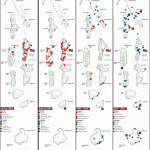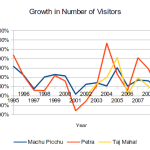The Maldives is known for its high end world class resorts. Popular among the rich and famous, it seems the right amount of money can buy you some tropical privacy in the modern hectic world.
This privacy and seclusion of many Maldivian resorts is what makes them unique. This is what differentiates the Maldives from its competitors, and over the last few years many new exclusive resorts have sprung up.
These high end resorts, and the tourism sector as a whole, are an important part of the Maldivian economy: in 2008, the sector contributed 27.2% of the Maldivian GDP.
However several recent surveys suggest a vast majority of people are finding the price of a Maldivian getaway too expensive. Discussions on well-known travel forums such as Tripadvisor.com show that many guests and potential tourists are off put by the high prices.
Feelings on the issue are mixed. Many visitors, especially families, look for a cheaper option, while honeymooners are more willing to pay the extra dollars for a once-in-a-lifetime opportunity.
There is demand from the high end markets for exclusive resorts. Ahmed Solih, permanent secretary for the tourism ministry noted that “expensive is a term dictated by demand & supply”.
Yet according to Solih, the development of a mid-market tourism sector in the Maldives catering to the huge global middle class has always been on the government’s agenda.
“We lease the land to the developer, but it’s the private sector that makes the decision on who they will cater for,” said Solih.
The many tour operators and resort developers opt to cater for the high end market due to the proven profitable returns.
Solih continued: “In the Maldives, each resort has its own power and water generation, each resort is self sufficient, and for every head staying, there are two staff and they also live on site. This makes resorts a very expensive operation to maintain,” he said.
However the recent regulations allowing guest houses on inhabited islands and the introduction of a national transportation system (the Maldivian Dhoni Services, or MDS) has the potential to open the country to the mid-market tourist sector.
Former Minister of Tourism Abdulla Mausoom said ” it is vital to maintain the exclusive image that we have created for the Maldives, but with careful management, a venture into the mid-market sector is important.”
Both Solih and Mausoom said that it was not just a matter of accommodation, and that the infrastructure had to be in place for this new market.
Currently, guests are whisked off to their destinations on expensive seaplanes or fast boats to their destinations. If the mid-market sector is to gain a foothold in the country, a proper transportation system needs to be in place.
Another potential market for the Maldives is the Indian and Chinese middle class. India currently has the largest middle class in the world consisting of nearly 300 million people, contributing US$380 billion to the consumer market.
With such a large market at such a close proximity, it is surprising that only 2.4 per cent of the country’s tourists arrive from India.
Speaking on this issue, Solih noted that ” it is true that the Indian market has huge potential. According to World Trade Organisation (WTO), one in five tourists are now Indian. The reason that Indians do not come here is because our current packages are not desirable for them.
“Most Indians would come for a couple of days, at the most, and they look for duty free shopping complexes,” Solih claimed.
Indians like many Maldivians, love to go shopping when they are overseas. If we are to cater for these new emerging markets, we must plan on what it is they are looking for.
“The success of the tourism industry in the Maldives has been due to carefully planned expansion,” Mausoom.
The current system is well established, and has reaped benefits for the Maldives. It is now up to the developers and tour operators to decide whether they are willing to cater for the new markets that are out there.





y ur so woory god is there.first obey tha god...........
Anni First obey the god.............
Go Utd!!!
The reason why mid-market tourism has not emerged in the Maldives is because of the tax regime in the country:
a) Maldives currently bids out resorts on a rent-bed basis - which means that unless you have a high end luxury 'bed' - you cannot justify paying over 10-15,000USD per bed per year for the resorts.
b) Maldives currently has a constant bed-tax (of 15 odd dollars) rather than an ad-valorem tax. This means that if you have a 100 dollar bed - your tax is 15% but if you have a 1000 dollar bed your tax is only 1.5%.
The surprising thing is that the 2009 economic crisis, most mid-market resorts did much better than high-end. So the tax incentives of the government have to change in order to develop this market.
The Maldivian tourism product has always consisted of its unique environment, its exclusivity, and hospitality.
Over the past 37 years since the development of tourism, major changes have been brought to government regulations concerning the development and expansion of tourism, where tourism had initially been restricted to specific zones; it is now open to all the atolls in the Maldives.
Tourism development was largely unplanned until 1978 and took place according to individual initiative. It is important that tourism should not be developed to a stage where the economy relies too much on the industry.
In countries where natural resources are scarce, governments have to ensure productive utilisations of resources, where the allocation of resources in a particular industry does not jeopardise the productive capacities of another industry.
When it comes to the type of market that we aim to cater to, there are a lot of challenges that we face today. It is not surprising that a majority of the newly emerged resorts have opted to cater to the exclusive market. The choice had been made long before the development of these resorts had taken place.
The prices of their beds were long decided, based on a number of factors including the bidding process, the need to still employ foreign expatriates in the industry, the lack of an adequate infrastructure in the country, etc. The option of catering to a 'mid-market' was never on the table for the recently developed resorts - the bids were simply won over by the highest bidder which meant higher room rates in the end.
There are a lot of things that need to be carefully studied and revised when it comes to the future of the tourism industry in the Maldives. The expansion of tourism to all the atolls in the Maldives could arguably lead to negative impacts to the fragile environment of the Maldives.
The Maldives have always been a unique product and demand for this product will continue to exist as long as the the concept is not forgone in the pursuit of development.
[47.1] (As for) those who disbelieve and turn away from Allah's way, He shall render their works ineffective.